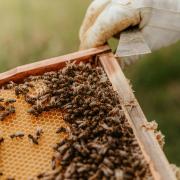
Masks have become an essential part of daily life, a commodity in our ‘new normal’, and it’s practically impossible to go anywhere without one now - but when you leave the house for the weekly shop or trip to the post office, do you know that grabbing a blue disposable mask can have catastrophic consequences for both the environment and your community? It’s become impossible to ignore the overwhelming amount of waste caused by our consumption of disposable masks, and attention must be drawn to the latest issue adding to the already spiralling environmental crisis across the world.
A dramatic spike in plastic use through disposable masks has come at a time “when we are clearly drowning in plastic", says Amelia Womack, deputy leader of the Green Party of England and Wales. With plastic pollution already one of the greatest threats to the planet previous to the pandemic, and potentially years ahead of compulsory mask-wearing in public, Pamela Coke-Hamilton, the United Nations Conference on Trade and Development’s (UNCTAD) director of international trade, calls for "stronger government guidance", saying “the sudden boom in the daily use of certain products to keep people safe and stop the disease is making things much worse.” However, this will be no mean feat, as the staggering figures of mask consumption on both a global and national level make startlingly clear. In a survey of 4,500 members of the UK public, TradeWaste found that 58.8 million face masks are being used every day in the UK, with 90% of them discarded and 53.3 million being sent to landfill, where it will take them over twenty years to break down. On a global scale, we are using 129 billion face masks per month, with PPE sales of $166 billion last year, but even the UK alone currently goes through enough face masks every two days to cover the whole of London.
What are these masks doing to us and the planet?
75 percent of these used masks will inevitably wind up in either landfills or the ocean, but they can currently be found littering the UK landscape wherever you look - in fact nearly a third of beaches are now scattered with various forms of PPE. Litter pickers on their patrols have reported massive increases in sightings of contaminated disposable face masks in towns and countryside alike, either tangled in shrubbery in parks and woods or floating in rivers and streams, already on their journey to fill the oceans. Although it can be difficult to properly dispose of masks that are neither reusable nor recyclable and could potentially be contaminated, discarding them carelessly in streets and undergrowth is certainly not the answer. Six-year-old Max Ratcliffe from West Yorkshire started a project to examine the effect of litter in his local environment and was shocked when he spotted a mask dumped every 50 metres in his local woods, saying “I think it’s really bad. People should put them in the bin. Animals might eat them, and they might die”.
Max is spot on with this observation, as wildlife experts have been raising concern for many months about the dangers that discarded masks are posing to wildlife in the UK and around the world. As well as the threat to animals such as foxes and squirrels, who may consume, get tangled in, or even be strangled by abandoned masks, the biggest danger is to marine wildlife, as green groups have been raising the alarm on the masses of plastic protective gear flooding into already contaminated seas and rivers. OceansAsia reported over 1.5 billion masks flowing into the world's oceans last year, and these 6,200 extra tonnes of marine plastic pollution are just waiting to ensnare or be ingested by marine wildlife, filling the food chain with more microplastics that will never biodegrade. From masks being found inside dead penguins and pufferfish in Brazil and Miami, to crabs in the Mediterranean washing up trapped in their plastic straps, it has become clear that masks and gloves are "particularly problematic" for sea creatures, as George Leonard, chief scientist from US-based NGO Ocean Conservancy, warns. "When those plastics break down in the environment, they form smaller and smaller particles," he stated, adding that these particles then enter the food chain and impact entire ecosystems.
But our unrelenting consumption of disposable masks doesn’t just have negative consequences for wildlife - it can cause us serious harm too. The UN Environment Programme (UNEP) reports that the risks to public health include infected masks littering public spaces and posing a danger of contaminating others, as well as the uncontrolled incineration of masks releasing toxins in the environment and potentially leading to secondary transmission of diseases. Charlotte Green from UK waste company TradeWaste warns the public of the dangers of touching a used mask, as “they should be treated like any other potentially contaminated material and only handled professionally using the right protecting equipment” - so although litter-picking is a good way to look after your local area, it’s necessary to exercise caution around any used PPE.
So, with disposable face mask use in the UK predicted to reach 19.5 billion over the course of this year - equivalent to the weight of 5 ½ Eiffel Towers - how can we tackle this mounting problem before it’s too late? Some believe it’s the government’s responsibility to counter this problem, and Green Party deputy leader Amelia Womack argues that, not only should the media be “discouraged from showing masks in ‘normal’, non-clinical, situations”, but that “the government should impose a ban on its own websites, leaflets and films doing so.”
The official guidance for England is to wear a reusable, washable one where possible, and throw away disposable face coverings in waste bins instead of dropping them as litter - although clearly this has not been enough to prevent people from doing so. However, an official government spokesperson stated last year that the NHS are actively looking at how PPE can be reused and decontaminated safely, and announced that they will be considering how they can "inform the UK's longer-term PPE use strategy into the future, including taking into account environmental concerns."
Moreover, the RSPCA strongly encourages people with disposable masks to ‘snip the straps’ once they have been used in order to prevent animals coming to harm, and the UNEP is urging governments to treat the management of medical waste as an essential public service and a vital element in an effective emergency response.
Charlotte Green from TradeWaste believes that “the way to tackle this potential environmental disaster is for everyone to move towards washable reusable masks” in order to cut down on single use mask litter and reduce the environmental impacts of mask manufacturing in the first place. “As a country we have worked so hard to reduce plastic consumption, yet we are sleepwalking into another nightmare”, she warns.
Here’s some ways you can help to reduce your mask waste today:
Use reusable masks without disposable filters and machine wash them regularly (which can save you up to £190 over the course of a year compared to constantly purchasing disposable ones)
Carry a spare to prevent you buying a disposable mask in an emergency
If you do need to use a disposable mask, take it home and snip the straps before placing it into a bin with a lid, or put it in a public bin.
Don’t try to recycle disposable masks, as they may get caught in recycling equipment and pose a potential biohazard to waste workers
Do not flush disposable masks down the toilet



























